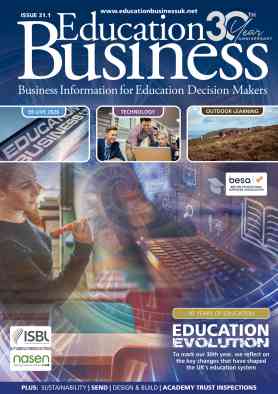
The freedom to innovate
How can the free schools programme meet the twin challenge of creating more school places and improving educational standards? Sarah Pearson of the New Schools Network shares her views.
School leaders are all too used to hearing the statistics about schools in England: we have many brilliant schools in our country, but there are not enough good places to go around. One in seven children go to primary schools that fall short, and at secondary it’s one in four. In many parts of the country, parents have no option other than to send their children to schools that are not good enough.
On top of this there is a places crisis looming, with the predicted school age population set to rise over the coming years. Official estimates suggest the school age population will rise by nearly 900,00 to 7.9 million by 2024, which is the highest since the 1980s.
Against this backdrop, it is hardly surprising that the free schools policy has been so quickly embraced. With the government pledge to open 500 more new schools by 2020, there has never been a better time to set up a school from scratch and it is school leaders and teachers that are leading the charge.
Over 70 per cent of free schools have been set-up by teachers or existing schools and for these school leaders there is an opportunity not just to add extra capacity to a stretched school system but the chance to set up a school from scratch. Where teachers and headteachers have a different vision – including more music, more outdoor activity, bilingual lessons, a longer school day, all-through education or using different models of teaching – the policy allows them to realise their ambitions and change children’s lives for the better.
Staff and career development
Getting involved in a new school project does not mean leaving a school, or losing your best staff. As schools expanding into Multi-Academy Trusts are learning, new projects – whether sponsoring existing schools or setting up new ones – create new opportunities for teachers and staff and can offer a powerful way to retain the best members of your team.
Critically, the impetus to consider such growth can come from a variety of sources, not just the headteacher. Senior leaders or even business managers can and have taken driving roles in creating a new school by bringing together a team of teachers and other professionals and using their knowledge and experience to help bring an outstanding education to more students across their local area.
Time to step-up?
Because of rising demand for school places, many existing schools are expanding. But 71,000 – one in five – of the new places created by expanding primary schools in the last five years has been in a school judged to be Requires Improvement or Inadequate by Ofsted. This isn’t just bad for the children who will be sent to these schools, it actually makes it harder for struggling schools to turn themselves around.
Opening new schools is the only way we are going to be able to meet the twin challenge of meeting rising demand for school places and improving educational standards across the country. The free schools programme offers teachers and school leaders an unparalleled opportunity to make a difference to a greater number of lives than ever before. Whether it is the addition of a new school to a Multi-Academy Trust, an existing single school adding to its provision, or a group of schools acting together to fix the need that all of them can see, successful schools and teachers are using the free schools policy to create brilliant new schools.
A vigorous process
The next chance to apply to the DfE to open a free school is in September, with the next wave being submitted in March 2017. This is the time to seize the opportunity to make a difference and be part of the system working towards offering a good school place for every child.
Make no mistake, setting up a free school is not easy. Any group that wants to propose a free school must show they have the expertise and ability to set up a new school from scratch. They must go through a rigorous applications process and demonstrate support from local parents who will send their children there.
Once open, free schools are closely regulated by the Department for Education both nationally and regionally, and are inspected by Ofsted in the same way as any other school.
However, although challenging, setting up a free school is achievable. It takes commitment and dedication to turn your vision into a reality but New Schools Network has helped hundreds of groups submit successful free school applications.
Dixons Academy Trust
The Dixons Academy Trust is currently responsible for eight schools across Bradford and is planning to open a new all-through free school in Leeds. Dixons now has four open free schools.
Schools include Dixons Trinity, the first secondary free school to be rated as Outstanding, Dixons Music Primary, which has music incorporated throughout the curriculum, and Dixons McMillan Academy, which was set up in response to Trinity being oversubscribed.
Every Dixons school is rooted in their clear mission and commitment to the core values of hard work, trust and fairness. The schools operate strict routines, build relationships at all levels and operate in a ‘no excuses’ culture that pushes every child to reach their full potential.
Despite their deprived intake, every Dixons free school has relentless ambition for their students, with every pupil encouraged to ‘climb the mountain’ towards university.
XP School
A secondary school for 11-18 year-olds in Doncaster, set up by a group of local teachers who wanted to pioneer a more innovative style of education, based on the success of High Teach High in the USA. XP School is using its freedoms as a free school to pioneer an Expeditionary Learning style curriculum, which is based around pupils completing challenging projects or learning expeditions that cross over different subjects.
Free from traditional constraints, teachers at XP School are able to design creative projects that integrate different subjects, skills and competencies such as problem‑solving, critical thinking and collaboration.
So far pupils have looked at the site for the school’s permanent building and worked with local partners to think about what makes a good community. This allows them to learn through cross-subject expeditions rather than separate subjects, although pupils will still sit GCSE exams and every project is mapped to National Curriculum standards.
Following the success of the XP school a sister school – XP East – has been approved and is currently in the pre-opening stage.
East Birmingham Network Academy
The East Birmingham Network (EBN) is a group of 12 schools across Birmingham that used the free school policy to meet a gap in the existing provision of the city. They were able to design their own alternative provision to suit the specific needs of the pupils who they knew were being failed. It was the first school of its kind in the country, catering for 13-16 year-olds who were failing to thrive at mainstream education, or who were at risk of exclusion.
The EBN’s mission is to help them develop the academic and behavioural skills necessary to be successful in further education. The school has a total capacity of 90 pupils and will deliver a mainstream education with a no excuses approach to behaviour.
Following the success of their first school, EBN have now opened a second school for students aged 13-16. This will cater for students who cannot attend a mainstream school due to illness, bullying, disengagement, poor behaviour or other circumstances.
Both EBN schools offer a programme of study that encompasses GCSEs in sciences, English and maths, as well as the opportunity to work towards vocational qualifications in a range of other subjects.
Further information
www.newschoolsnetwork.org
Latest News
26/01/2026 - 10:40
The proposed Scottish Budget for 2026-27 commits up to £200 million to the Scottish Attainment Challenge.
26/01/2026 - 10:24
The Welsh Government has set out the key challenges facing tertiary education in Wales and has launched a call for evidence to help address these challenges.
23/01/2026 - 10:47
Almost half (45%) of school leaders needed mental health and well-being support in just a year, a new survey from union NAHT has found.
22/01/2026 - 10:44
The film, ‘The Lunch They Deserve’, seeks to focus the nation on the need for better school food standards before the provision of Free School Meals is extended.
21/01/2026 - 11:24
Speaking at the Bett UK Conference, the Education Secretary said the EdTech Testbed will recruit schools and colleges to put the latest tech and AI tools through their paces.







